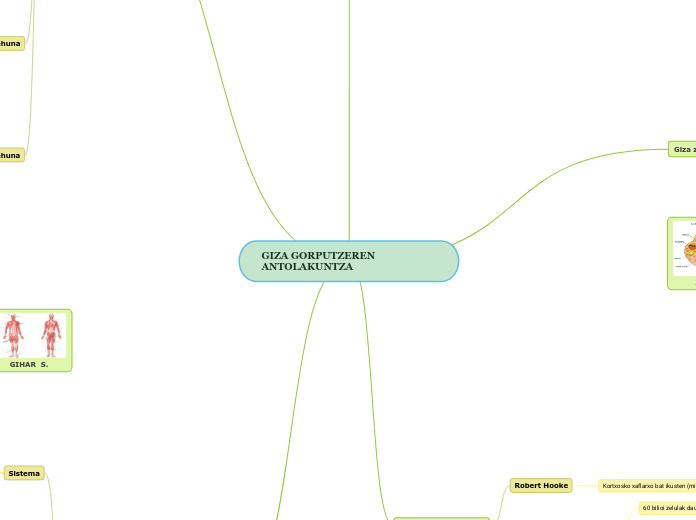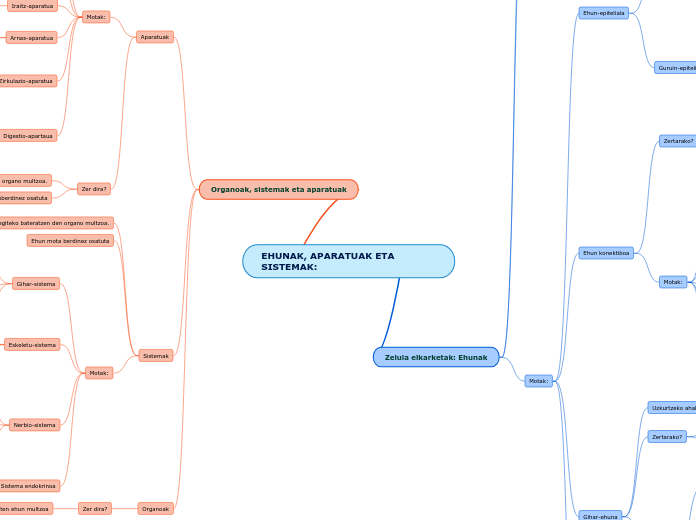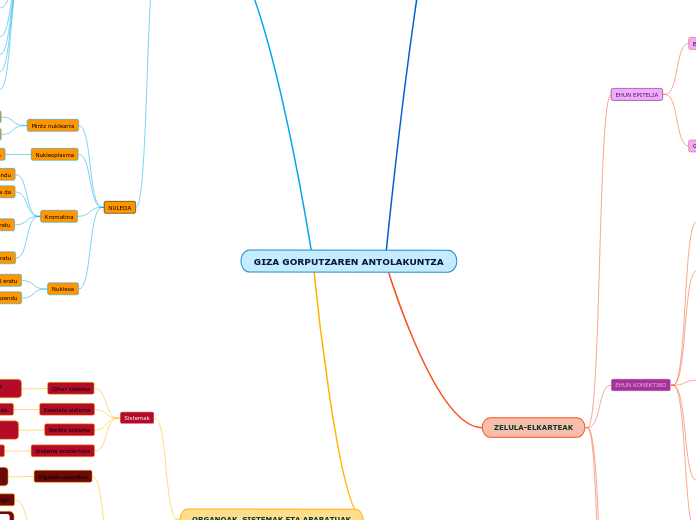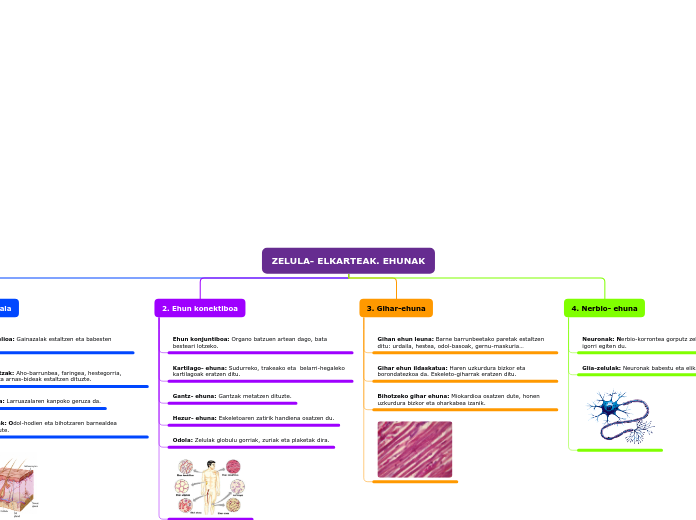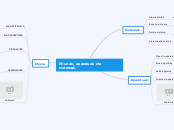ANTOLAKUNTA MAILAK
IRAITZ A.
ZIRKULAZIO A.
UGAL A.
LOKOMOZIO A.
ARNAS A.
DIGESTIO A.
S. ENDOKRINO
NERBIO S.
ESKELETU S.
GIHAR S.
ZELULA
GIZA GORPUTZEREN ANTOLAKUNTZA
Tenses demonstrate the time of actions centered around the subject of the sentence. These actions are called verbs and change according to tenses.
ORGANOAK ,SISTEMAK ETA APARATUAK
Aparatua
Lokomozio aparatua
Arduratzen da
Gorputzaren organoen mugimenduaz
Lokomozioaz edo mugimenduaz
Ugal aparatua
Sortu
Ugal zelulak
Gameto
Zirkulazio aparatua
Hondakinak zeluletarik iraitz aparatua
Mantenugaiak zeluletara eraman
Iraitz aparatua
Kanpoaldera bidali
Oodolean dauden soberakinak
Zelulak sortutako hondakinak
Arnas paratua
Gas trukea
Oxigenoa odolera bidali
Karbono dioxidoa bota
Digestio aparatua
Lortutako mantenugaiak odolera
Elikagaien deskonposaketa
Sistema
Sistema endokrinoa
Hormonak sortu
Nerbio sistema
Informazioa hartu eta interpretatu
Barne
Kanpo
Erantzun egokiak prestatzea
Eskeletu sistema
Babestu
Organoen
Lokomozioa
Gihar sistema
Gorputzaren jarrerari eusteaz
Mimikaz
Lokomozioaz
EHUNAK
There are four Future tenses:
- Future Simple ('with Will' and 'with Going to')
- Future Continuous
- Future Perfect Simple
- Future Perfect Continuous
Nerbio ehuna
Glia zelulak
Elikatzen
Babesten
Neuronak
Neurona motorrak
Zentzumen neuronak
Gihar ehuna
Future Perfect Simple is used for:
- an action that will be finished by a particular time in the future
- an action that starts before and continues up to another action or time in the future
- an action that will finish before a certain time in the future, but it is not known exactly when
Adverb used with Future Continuous:
- tomorrow (e.g. tomorrow by 7)
Bihotzeko gihar ehuna
Structure:
Will + Subject + Have + Past Participle?
e.g. Will you have met your colleague by this time tomorrow?
Ez dira renobatzen
Type in your own examples or you can also choose from the examples below.
Form of word "to be":
Will I have been?Will you have been?Will he/she/it have been?Will we have been?Will you have been?Will they have been?
Form of word "to have":
Will I have had?Will you have had?Will he/she/it have had?Will we have had?Will you have had?Will they have had?
Gihar ehun ildaskatua
Structure:
Subject + Won’t Have + Past Participle
e.g. I won’t have met my friend form United States by this time tomorrow.
Uzkudura
Type in your own examples or you can also choose from the examples below.
Form of word "to be":
I will not have beenYou will not have beenHe/She/It will not have beenWe will not have beenYou will not have beenThey will not have been
Form of word "to have":
I will not have hadYou will not have hadHe will not have hadWe will not have hadYou will not have hadThey will not have had
Borondatezkoa
Bizkor
Gihar ehun leuna
Structure:
Subject + Will Have + Past Participle
e.g. I will have met my friend form United States by this time tomorrow.
Gernu maskuria
Odol basoak
Hestea
Urdaila
Type in your own examples or you can also choose from the examples below.
Form of verb 'to be':
I will have beenYou will have beenHe/She/It will have beenWe will have beenYou will have beenThey will have been
Form of verb 'to have':
I will have hadYou will have hadHe/She/It will have hadWe will have hadYou will have hadThey will have had
Ehun konektiboa
Future Continuous is used:
- for an action that is likely to happen in the future and continue for an expected length of time
- for an action that will be in progress at some point in the future
- for action verbs (e.g. running)
- for predictions about future events
Adverb used with Future Continuous:
- tomorrow (e.g. tomorrow at 5 o'clock)
Odola
Plaketak
Globuluak
Gorriak
Zuriak
Hezur ehuna
Z. osteozito izenekoak
Kartilago ehuna
Structure:
Will + Subject + Be +Verb-ING?
e.g. Will you be having fun at the party?
Z. kondrozito izenekoak
Type in your own examples or you can also choose from the examples below.
Form of word "to be":
Will I be being?Will you be being?Will he/she/it be being?Will we be being?Will you be being?Will they be being?
Form of word "to have":
Will I be having?Will you be having?Will he/she/it be having?Will we be having?Will you be having?Will they be having?
Gantz ehuna
Structure:
Subject + Won’t Be + Verb-ING
e.g. He won’t be having fun at the party.
Z. adopozito
Type in your own examples or you can also choose from the examples below.
Form of word "to be":
I will not be beingYou will not be beingHe/She/It will not be beingWe will not be beingYou will not be beingThey will not be being
Form of word "to have":
I will not be havingYou will not be havingHe/She/It will not be havingWe will not be havingYou will not be havingThey will not be having
Ehun honen funtzioak
Isolatzaile termikoa
Organoak babestu
Lipido erreserba
Ehun konjuntiboa
Structure:
Subject + Will Be + Verb-ING
e.g. You will be having fun at the party.
Lotailuak
Tendoiak
Type in your own examples or you can also choose from the examples below.
Form of verb 'to be':
I will be beingYou will be beingHe/She/It will be beingWe will be beingYou will be beingThey will be being
Form of verb 'to have':
I will be havingYou will be havingHe/She/It will be havingWe will be havingYou will be havingThey will be having
Ehun epiteliala
Future Simple is used:
- to predict an event in the future
- to invite
- to give orders
- to express willingness
- for actions that have not yet occurred but that will occur at a future date
Guruin epitelioa
'Going to' Future is used:
- to talk about our future intentions and plans
- for commands
Some adverbs used with 'Going to' Future:
- later
- tonight
- tomorrow
- next week
- next month
- next year
Mistoa
Structure:
BE + Subject + going to + Infinitive Form of Verb?
e.g. Are you going to read the whole book over the weekend?
Biak(pankrea)
Type in your own examples or you can also choose from the examples below.
Form of word "to be":
Am I going to be?Are you going to be?Is he/she/it going to be?Are we going to beAre you going to be?Are they going to be?
Form of word "to have":
Am I going to have?Are you going to have?Is he/she/it going to have?Are we going to haveAre you going to have?Are they going to have?
Exokrinoa
Structure:
Subject + BE not + going to + Infinitive Form of Verb
e.g. He isn't going to spend his vacation in Hawaii.
Ez odolera (kanpoaldea)
Type in your own examples or you can also choose from the examples below.
Form of word "to be":
I am not going to beYou are not going to beHe/She/It is not going to beWe are not going to beYou are not going to beThey are not going to be
Form of word "to have":
I am not going to haveYou are not going to haveHe/She/It is not going to haveWe are not going to haveYou are not going to haveThey are not going to have
Endokrinoa
Structure:
Subject + BE (am/is/are) + going to + Infinitive Form of Verb
e.g. She’s going to be a professional dancer when she grows up.
Odolera(barrualdea)
Type in your own examples or you can also choose from the examples below.
Form of verb 'to be':
I am going to beYou are going to beHe/She/It is going to beWe are going to beYou are going to beThey are going to be
Form of verb 'to have':
I am going to haveYou are going to haveHe/She/It is going to beWe are going to beYou are going to beThey are going to be
Estaldura epitelioa
Future Simple with 'will'' is used:
- to predict the future
- for something with absolute certainty
- when we're talking about a decision at the moment of speaking
- promises, requests, refusals, offers
- future facts
Some adverbs used with Future Simple:
- tomorrow
- next week
- next month
- next year
Epidermisa
Structure:
Will + Subject + V1(First Form of Verb)?
e.g. Will you see Mary when she comes back from Denmark?
Azala( kanpo geruza)
Type in your own examples or you can also choose from the examples below.
Form of word "to be":
Will I be?Will you be?Will he/she/it be?Will we be?Will you be?Will they be?
Form of word "to have":
Will I have?Will you have?Will he/she/it have?Will we have?Will you have?Will they have?
Endotelioak
Structure:
Subject + Won’t (will not) + V1(First Form of Verb)
e.g. You won’t see Mary when she comes back from Denmark.
Odol hodien barnean
Bihotz barnean
Type in your own examples or you can also choose from the examples below.
Form of word "to be":
I will not beYou will not beHe/She/It will not beWe will not beYou will not beThey will not be
Form of word "to have":
I will not haveYou will not haveHe/She/It will not haveWe will not haveYou will not haveThey will not have
Muki mintzak
Structure:
Subject + Will + V1(First Form of Verb)
e.g. I will see Mary when she comes back from Denmark.
Arnas bideak
Ondestea
Hestegorria
Faringea
Aho barrunbea
Type in your own examples or you can also choose from the examples below.
Form of verb 'to be':
I will beYou will beHe/She/It will beWe will beYou will beThey will be
Form of verb 'to have':
I will haveYou will haveHe/She/it will haveWe will haveYou will haveThey will have
ZELULA ANIZTASUNA
Giza gorputzeko zelulak
250 motatakoak
Funtzioaren arabera
Forma
Tamaina
60 bilioi zelulak daude
Robert Hooke
Kortxosko xaflarxo bat ikusten (mikroskopio batekin)
Zelulak ikusi zituen baina hildak ziren
Giza zelulen egitura
There are four Past tenses:
- Past Simple
- Past Continuous
- Past Perfect Simple
- Past Perfect Continuous
Nukleoa
Past Perfect Continuous is used:
- for an action that started in the past and continued up to another point in the past
- to show cause and effect
Some adverbs used with Past Perfect Continuous:
- since (e.g. since yesterday)
- for (e.g. for 10 years, for 6 months)
Mintz nuklearra
Bikoitza
Poroak
Substantzien elkartruke
Nukleolo
Structure:
Had + Subject + been Verb-ING?
e.g. How long had they been living in London before moving here?
Erribosomen sorkuntzan lagundu
ARN-z osatuta
Type in your own examples or you can also choose from the examples below.
Form of word "to be":
Had I been being?Had you been being?Had he/she/i been being?Had we been being?Had you been being?Had they been being?
Form of word "to have":
Had I been having?Had you been having?Had he/she/it been having?Had we been having?Had you been having?Had they been having?
Kromatina
Structure:
Subject + hadn’t been/had not been + Verb-ING
e.g. I was tired because I hadn't been sleeping.
46 kromosoma osotu gizakietan
ADN-z osatuta
Z.zuzendu
Type in your own examples or you can also choose from the examples below.
Form of word "to be":
I had not been beingYou had not been beingHe/She/It had not been beingWe had not been beingYou had not been beingThey had not been being
Form of word "to have":
I had not been havingYou had not been havingHe/She/It had not been havingWe had not been havingYou had not been havingThey had not been having
Nukleo plasma
Structure:
Subject + had been + Verb-ING
e.g. They had been talking for over an hour before I arrived.
Nukleoaren likidoa
Type in your own examples or you can also choose from the examples below.
Form of verb 'to be':
I had been beingYou had been beingHe/She/It had been beingWe had been beingYou had been beingThey had been being
Form of verb 'to have':
I had been havingYou had been havingHe/She/It had been havingWe had been havingYou had been havingThey had been having
Zitoplasma
Past Perfect Simple is used for:
- an action that began in the past and is still going on at the moment of speaking
- an action that continued before and after another action
- a change of mind
- an action happening repeatedly in the past
The Past Perfect tense is not normally used alone. It is used to denote the earlier of two past actions. We use Past Simple for the latter action.
Some adverbs used with Past Perfect Simple:
- already, before, ever, never
- once, twice, yet
- just, up to then
- for, since
Organuluak
Structure:
Had + Subject + Past Participle?
e.g. Had they met Sarah before the party?
Zentrosomak
Zelularen zatiketarekin lagundu
Bakuoloa
Hondakin substantziak
Erreserbak
Lisosoma
Mantenugaien digestioa
Mitokondria
Arnasketa zelularra
Erribosomak
Proteinak sintetizatu
Golgiren aparatua
Gluzidoak sintetizatu edo fabrikatu
Erretikulu endoplasmatikoa
Type in your own examples or you can also choose from the examples below.
Form of word "to be":
Had I been?Had you been?Had he/she/it been?Had we been?Had you been?Had they been?
Form of word "to have":
Had I had?Had you had?Had he/she/it had?Had we had?Had you had?Had they had?
Leuna
Pikorduna
Sintetizatu
Gorde
Garraiatu
Zitoeskeleto
Structure:
Subject + hadn’t (had not) + Past Participle
e.g. They hadn’t met Julia before the party.
Proteinak eskeleto moduan
Type in your own examples or you can also choose from the examples below.
Form of word "to be":
I had not beenYou had not beenHe/She/It had not beenWe had not beenYou had not beenThey had not been
Form of word "to have":
I had not hadYou had not hadHe/She/It had not hadWe had not hadYou had not hadThey had not had
Hialoplasma
Structure:
Subject + had + Past Participle
e.g. They had already met Julia before the party.
Bertan
Zitoeskeletoa
Organulu
Atal likidoa
Type in your own examples or you can also choose from the examples below.
Form of verb 'to be':
I had writtenYou had writtenHe/She/It had writtenWe had writtenYou had writtenThey had written
Form of verb 'to have':
I have hadYou have hadHe/She/It has hadWe have hadYou have hadThey have had
Zelula mintza edo mintz plasmatikoa
Past simple expresses:
- an action that happened in the past and has no connection with the present
- an action that happened once in the past
- an action that happened regularly in the past
- an action that was true for some time in the past
- an event or action that already occurred
- an action that is finite - has both a starting and a stopping point
Some adverbs used with Past Simple:
- yesterday
- last month, last year
- ago (e.g. two days ago)
- in (e.g. in 1997)
- never, always, seldom, often, frequently, occasionally, once, twice
Eraketa
Structure:
Subject + did not/didn’t + Base Form of the Verb
e.g. They didn’t like my food.
Mintz bikoitza
Proteina
Lipido
Hiru geruza
Type in your own examples or you can also choose from the examples below.
Form of word "to be":
I was notYou were notHe/She/It was notWe were notYou were notThey were not
Form of word "to have":
I did not haveYou did not haveHe/She/It did not haveWe did not haveYou did not haveThey did not have
Funtzioak
Structure:
Subject + Verb in Past Simple (2nd form)
e.g. They lived in Spain three years ago.
Substantzien trukea ahalbidetu
Kanpotik barrura
Barrutik kanpora
Z.inguratu
Z.babestu
Type in your own examples or you can also choose from the examples below.
Form of verb 'to be':
I wasYou wereHe/She/It wasWe wereYou wereThey were
Form of verb 'to have':
I hadYou hadHe/She/It hadWe hadYou hadThey had
ANTOLAKUNTZA MAILAK
There are four Present tenses:
- Present Simple
- Present Continuous
- Present Perfect
- Present Perfect Continuous
Mailak
Organismo maila
Sistema eta aparatu maila
Organo maila
Ehun maila
Zelula maila
Maila molekularra
Es organikoak
Organikoak
Maila atomikoa
Maila subatomikoa
Zelulak
Present Perfect is used for:
- an action that occurred at a time which is indefinite and has its effect on the subject
- an action that occurred many times and has the possibility to occur in the present/future
- an action that began in the past and is still going on in the present
Some adverbs used with Present Perfect:
- just
- already
- yet
- for
- never/ever
- up to now
Oinarrizko osagaia
Structure:
Subject + have/ has + Past Participle (3rd Form of the Verb)
e.g. She has finished the letter.
Bakoitzak bizi funtzio guztak bete
Zelula bakoitzak informazio genetiko gustia gordetzen du
Present Perfect Continuous is used:
- to describe an action that started in the past and has continued up to the present
- to describe an action that has just finished
Some adverbs used with Present Perfect Continuous:
- always
- only
- never
- ever
- still
- just
Zelula baten jatorria beste zelula bt da
Structure:
Subject + haven’t (have not)/ hasn’t (has not) + Past Participle
e.g. She hasn’t finished the letter.
